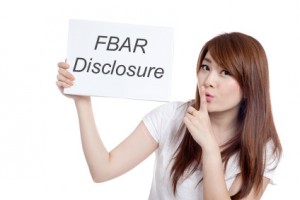FBAR: Quiet Disclosure vs. Offshore Voluntary Disclosure Initiative (OVDI)

United States citizens or residents may be required to report interest in certain foreign financial accounts on Form FinCen 114, Report of Foreign Bank and Financial Accounts (FBAR). Failure to do so can result in penalties, including steep fines and possible jail time in cases involving tax fraud.
Some U.S. expats who want to be compliant in order to avoid penalties are opting to do a FBAR quiet disclosure. A quiet disclosure is the filing of an amended return for previous tax years to include previously undisclosed income from Foreign Financial Accounts, as well as an acknowledgement on Schedule B of either an interest in or signatory authority over Foreign Financial Accounts. In addition, the quiet disclosure includes filing the delinquent FBAR reports. Sounds simple enough, but a quiet disclosure more than likely will trigger an audit or examination that can lead to substantial tax, penalties and even criminal prosecution.
In some cases, quiet disclosures have led to the loss of the taxpayer’s life savings, including the unreported foreign financial accounts and other Foreign Financial Assets the taxpayer may have. The IRS will attempt to seize any assets available to recover fees owed to them.
While some taxpayers are willing to take this chance, the Offshore Voluntary Disclosure Initiative (OVDI) is an option that can help a U.S. taxpayer become compliant and avoid exposure to a substantial tax liability, as well as civil and criminal penalties, interest and potential criminal prosecution. According to the IRS:
The IRS is aware that some taxpayers have attempted so-called “quiet” disclosures by filing amended returns and paying any related tax and interest for previously unreported offshore income without otherwise notifying the IRS. Taxpayers who have already made “quiet” disclosures may take advantage of the penalty framework applicable to voluntary disclosure requests regarding unreported offshore accounts and entities. Those taxpayers must send previously submitted documents, including copies of amended returns, to their local CI office.
Taxpayers are strongly encouraged to come forward under the Voluntary Disclosure Practice to make timely, accurate, and complete disclosures. Those taxpayers making “quiet” disclosures should be aware of the risk of being examined and potentially criminally prosecuted for all applicable years. Furthermore, U.S. taxpayers residing overseas should be aware that the statute of limitations for a number of tax issues may be tolled.
The IRS has identified, and will continue to identify, amended tax returns reporting increases in income. The IRS will be closely reviewing these returns to determine whether enforcement action is appropriate.
U.S. taxpayers should consider their options very carefully before making contact with the IRS. Staying compliant should be the priority to avoid issues that can lead to exorbitant fees and a criminal investigation. Understanding your rights and responsibilities as a U.S. taxpayer is key to making sure you do not communicate anything to the IRS that can result in additional tax issues.
If you are facing tax issues, concerns or have questions on how to proceed for unreported FBARs, it’s best to speak with a skilled and experienced U.S. tax attorney before contacting the IRS.


